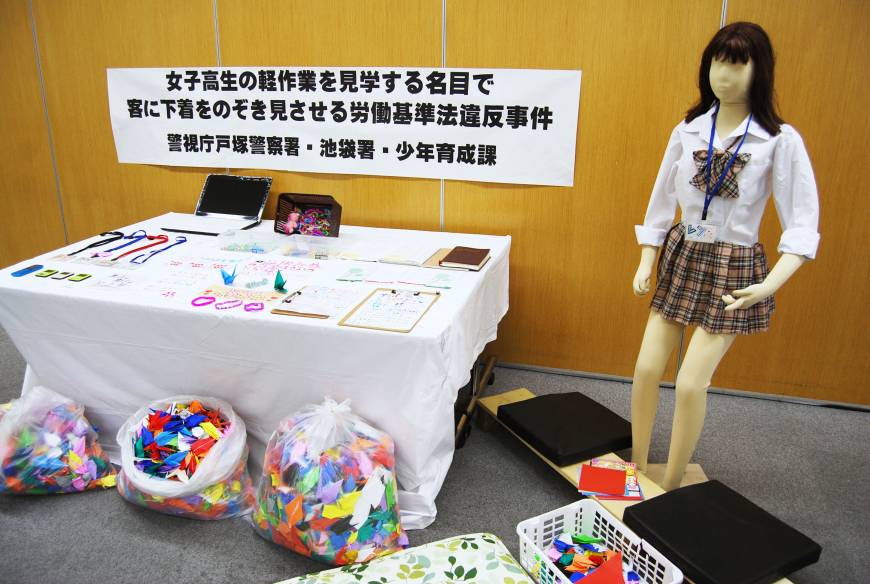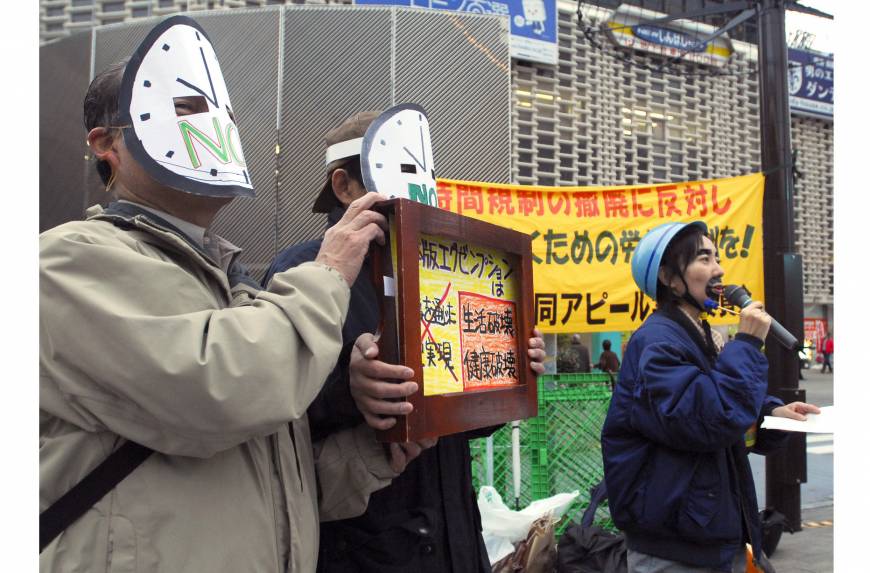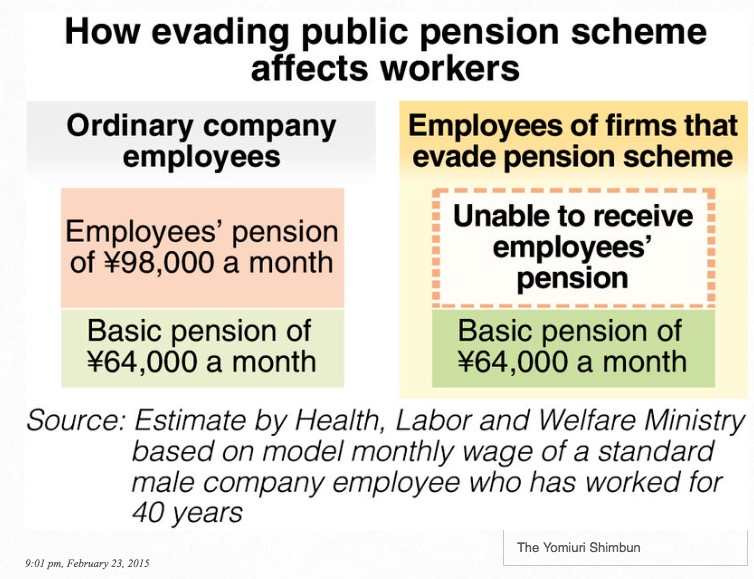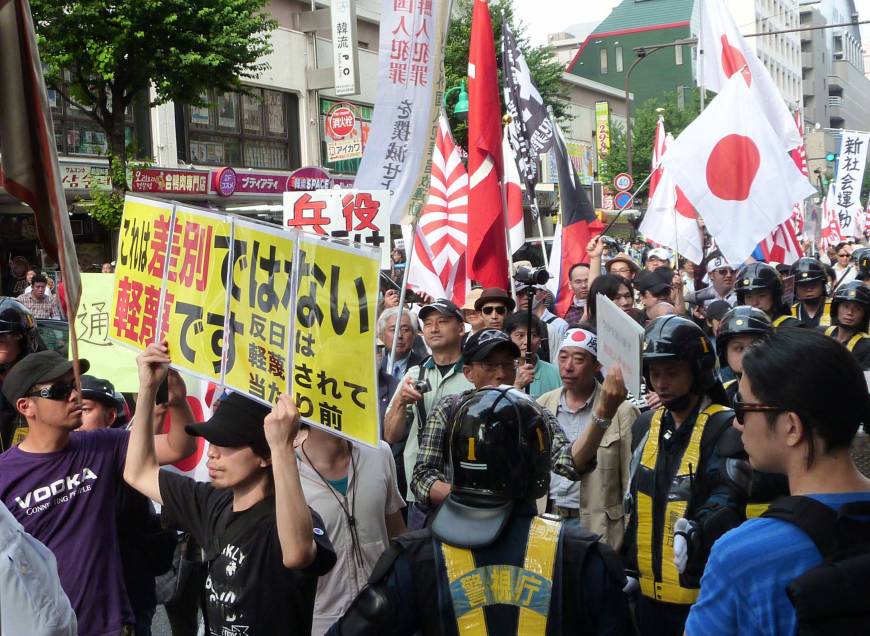News
過労死をいっそう促進する「残業代ゼロ制度」はどう考えればいい
働けど
働けどなお
我が暮らし
楽にならざり
じつと手をみる
1910(明治43)年に26歳で夭逝した歌人の石川啄木による、あまりにも有名な短歌である。「どれだけたくさん働いても、一向に暮らしは楽にならないのはなぜだろう? 途方に暮れて、思わずじっと自分の手を見つめてしまう・・・」という意味である。
啄木は若き才能あふれる文学者であったが、生前はその才能が世間になかなか認められず、代用教員や校正など、生活のために様々な職に就いていた(ちなみに、彼は周囲の人に借金をしまくっており、しかもその返済をしなかったという)。ただし、啄木は肉体労働には就いていなかったので、「じつと」見つめていた手は、きっと赤剥けもささくれもなく、細く白かったのだろうと推測できる。
In the News
執行委員長奥貫妃文が、フランスのリベラシオン誌Arnaud Vaulerin記者より、マタハラの件で取材を受けました。記事のメインはマタハラネット代表の小酒部さやかさん。奥貫は、マタハラが起こる背景や法規定との関連についてコメントしました。
Executive president Hifumi Okunuki got interviewed by Liberation in the French press journalist Arnaud Vaulerin about Japanese matahara (maternity harassment). The article is about Sayaka Osakabe of Matahara Net. Okunuki made a statement about the background of matahara.
組合活動した大学の外国人講師7人雇い止め「ユニオンの排除が目的か」弁護士が批判
東京・豊洲などにキャンパスがある「芝浦工業大学」で英語を教えていたが、3月末に雇い止めになった外国人の元非常勤講師7人が4月7日、厚労省記者クラブで会見を開いた。元講師たちは、カリキュラムの変更を理由に雇用契約が更新されなかったのは無効だとして、雇用の継続を訴えた。
7人は労働組合を結成して、大学側と労働環境の改善に向けた交渉をしていた。7人を支援する弁護士は「ユニオンを排除するためにカリキュラムを変えたのではないか」と語っている。
800,000 firms likely dodged pension scheme
The Yomiuri Shimbun
About 800,000 small and midsize companies are strongly suspected of evading their legal obligation to join the public pension scheme for company employees, according to the results of a joint investigation by the Health, Labor and Welfare Ministry and the National Tax Agency.
The ministry identified the companies that have likely not joined the pension scheme by examining data provided by the tax agency.
Forty years after Zainichi labor case victory, is Japan turning back the clock?
I was hoping to start off the Year of the Sheep in a subdued, “sheepish” fashion, but bad news just keeps on coming. The ruling coalition is working hard to push through a bill to abolish overtime pay for high-income workers and another to deregulate temp-agency employment (haken). These bills will hurt the conditions of all workers in Japan, including foreigners.
Speaking of foreign workers, I’d like to focus this month on how labor laws in Japan handle the issue of nationality. But first, a detour:
Japanese society over the past couple of years has taken a dangerous turn toward extreme nationalism. My husband noted, “Since 2014, both NHK and the private broadcasters have changed how they refer to Japan, from using the word Nihon to Nippon.” The latter was used during World War II and is associated with jingoistic militarism. It also has a harsher consonant sound than “Nihon.”
Abe, business heads, labor unions agree on efforts for wage growth
Prime Minister Shinzo Abe’s administration crafted a joint statement Tuesday with leaders of business organizations and labor unions, aiming to bolster the economy through wage growth.
At a trilateral meeting, Abe also urged large manufacturers, which have benefited from the yen’s slide, to trade with their subcontracting companies at higher prices to allow the effects of his “Abenomics” policy mix to trickle down to smaller firms and local economies.
Toyota labor unions to demand minimum ¥6,000 pay hike
Japan Times Staff Strikes For Higher Bonus
Editors and other staffers at Japan’s premier English-language newspaper walked out Wednesday, demanding a higher winter bonus.









